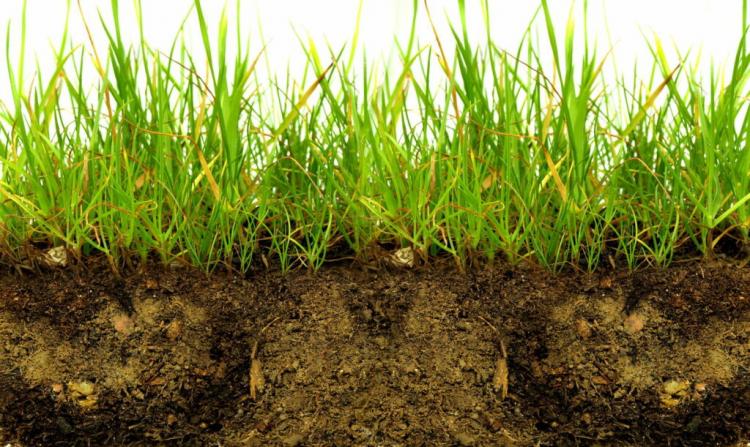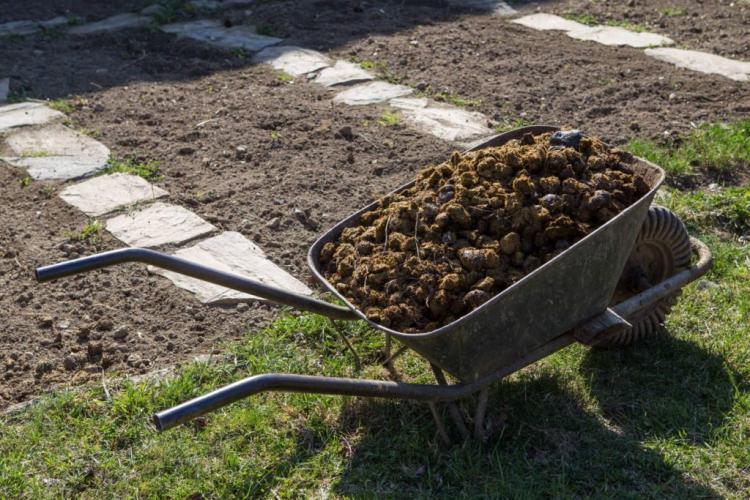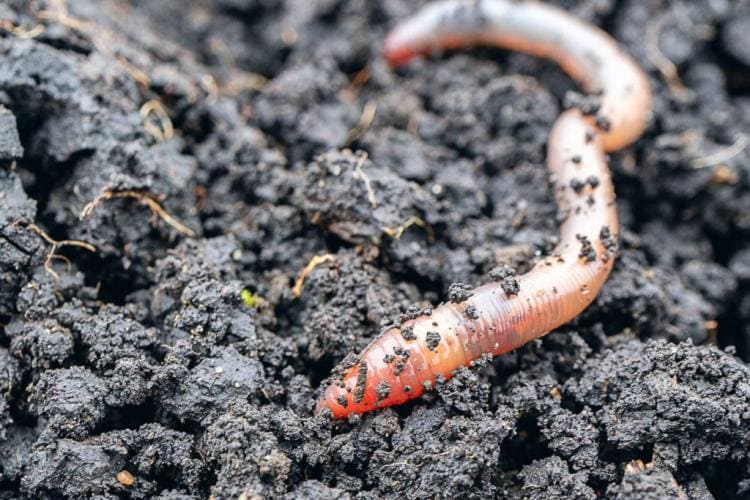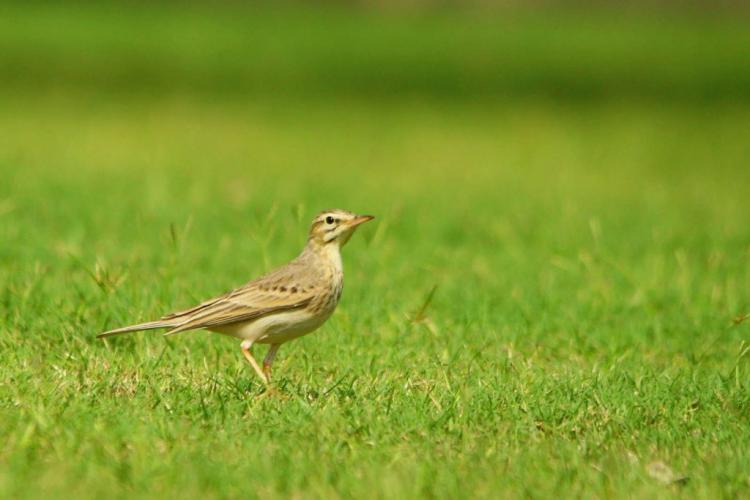Organic lawn fertilizer: benefits of natural fertilizer
For a lush green, the lawn must be properly fertilized. You can find out here why you should use organic lawn fertilizer.

The choice of lawn fertilizer influences the quality of the soil under the lawn [Photo: Lukas Gojda / Shutterstock.com]
Both the ingredients and the effects of organic and mineral lawn fertilizers differ from one another. Proper lawn care will not only affect how your lawn will look this year, but also its ability to weather the winter and the soil beneath its roots. We educate you about organic lawn fertilizers so that you can make the right choice when shopping.
Organic lawn fertilizers promise lawn care with a clear conscience. But some claim that a vigorous lawn cannot become anything with such “eco-stuff”. In this article, you can learn why the natural route can also be the most effective.
Organic lawn fertilizer: ingredients and effects
Table of Contents
How do the ingredients in an organic lawn fertilizer differ from those in a mineral lawn fertilizer? The nutritional elements are not pure, but built into organic structures, which of course influences the effect of the fertilizer.
Ingredients of organic lawn fertilizers
Organic lawn fertilizers contain the nutrients that are important for the lawn in organically packaged form. This “packaging” can be of animal or vegetable origin: Many organic fertilizers are made from slaughterhouse waste such as blood, horn and bones. However, more and more often, purely plant-based raw materials are used, which arise in the food industry. Animal droppings are also often used in dried form.

Organic lawn fertilizer from animal manure usually smells stronger than vegetable fertilizer [Photo: Gatherina / Shutterstock.com]
In principle, an organic fertilizer contains all the nutritional elements that the living being it contains has taken in itself in order to be able to live. Accordingly, a lawn fertilizer made from plants also contains all the nutrients that plants need. Of course, the amount can vary – depending on which part of the living being was used. Fertilizer manufacturers vary the composition of the starting materials in such a way that the needs of a wide variety of crops can be satisfied. The nutritional elements nitrogen (N), phosphorus (P), potassium (K), magnesium (Mg), sulfur (S) and calcium (Ca) in lawn fertilizers are adapted to the needs of the lawn. The trace elements iron (Fe), zinc (Zn), molybdenum (Mo), manganese (Mn), boron (B), chlorine (Cl), nickel (Ni) and copper (Cu) are only required in very small quantities. Therefore, they are hardly considered in the manufacture of fertilizers, but are always present in traces. Since lawns have an increased need for nitrogen, potassium and magnesium, these nutritional elements are particularly well represented in organic lawn fertilizers.
Effect of organic lawn fertilizers
The effect of organic lawn fertilizers corresponds to the natural nutrient supply of plants. In contrast to fertilization with mineral fertilizers, the plant nutrients first have to be freed from their organic cover in order to be available. The conversion of organic material into mineral nutrients can only be carried out by soil organisms. This is a biological process. Worms, insects and other multicellular soil dwellers do the coarse shredding. Subsequently, soil bacteria set to work to process structures on a cellular level. Since the work of the organisms in the soil takes a certain amount of time, the effect of organic lawn fertilizers sets in with a slight delay within one month of application. This is followed by a phase of even release until the nutrients contained are used up. So there is a natural long-term effect.

The conversion of organic material into mineral nutrients is carried out by soil organisms [Photo: Andrei Metelev / Shutterstock.com]
Since the soil organisms are influenced by their environment, the implementation always depends on the weather. Moisture, warmth and an oxygen-rich soil promote the implementation. Cold and too wet, oxygen-poor soil, on the other hand, inhibit them. However, this fact is by no means a disadvantage: in this way, many nutrients are always available when the weather is “vigorous” for the fertilized lawn and it needs a lot of nutrients. You can find out more about organic fertilizers in general here.
Tip: In addition to the so-called mineralization, i.e. the release of nutrients from organic material, another process can take place in parallel: humification. In this case, the material is not broken down due to the lack of microbial activity, but only broken down and modified. The breakdown is followed by the build-up of so-called humic acids, which are the basis for humus. You can find more about the formation of humus and the influencing factors in this special article.
Summary of the effects and ingredients of organic lawn fertilizer:
- Organic lawn fertilizer contains nutrients in natural packaging
- In addition to the main nutrients that are particularly important for the lawn, it also contains trace elements
- The release of nutrients depends on soil organisms
- The living conditions of the organisms influence the release
- Organic lawn fertilizer has a natural long-term effect
- In addition to the release of nutrients, humus can also form
Organic autumn lawn fertilizer
Organic fertilizers are also suitable for preparing the lawn for winter. Organic autumn lawn fertilizers, however, are no longer nitrogen, but rather potassium, because potassium ensures a high level of frost tolerance. Lowering the nitrogen content prevents freshly sprouting stalks from falling victim to the often cold autumn temperatures. If the temperatures drop, the release of nutrients stops, so that leaching or incorrect fertilization is prevented. If the next spring brings permanently warmer temperatures, the release of nutrients will slowly start again and can thus encourage a vigorous spring shoot of the lawn. All of these properties of organic fertilizers make them a particularly good choice when caring for autumn lawns. Here you can get information about the right lawn fertilization in autumn and here you can find out everything about our Plantura organic autumn lawn fertilizer.

Organic autumn lawn fertilizer protects against frost damage and promotes spring shoots
Summary: Organic autumn lawn fertilizer
- Autumn lawn fertilizers are low in nitrogen and high in potassium
- Both protect the lawn from frost damage
- Organic autumn lawn fertilizers protect against leaching and incorrect fertilization before winter and can promote spring shoots
Organic and mineral lawn fertilizer in comparison
The use of mineral lawn fertilizers is preferred by many more or less professional gardeners. At first glance, this has advantages: The low price, the high nutrient content and the immediate effect make bargain hunters and the impatient sit up and take notice. In order to do away with these supposed advantages, we have compared organic and mineral lawn fertilizers for you.
Benefits of organic lawn fertilizer
| aspect | Organic lawn fertilizers … | Mineral lawn fertilizers … |
|---|---|---|
| Soil life | stimulate the diversity and activity of soil life, which improves soil structure. | reduce the diversity and activity of the soil life, which deteriorates the soil structure. |
| Humus content | maintain or even build up humus, which increases nutrient and water storage capacity. | lead to humus degradation due to the high nutrient content, the soil quality decreases. |
| Overfertilization and leaching | provide nutrients only in vigorous weather. This avoids over-fertilization and leaching. | provide nutrients regardless of the weather, so that over-fertilization and leaching of nutrients into the groundwater are more likely. |
| Long-term effect | have a natural long-term effect. | have a short-term effect, unless they are produced as a depot fertilizer with a long-term effect. In this case, they are more expensive. |
| Effective speed | act delayed, but slow implementation promotes steady growth. | act very quickly, which often results in intermittent waxing. |
| Manufacturing | are less energy-intensive in their production and use leftovers from the food industry. | are produced with high energy requirements or mined in partially limited fossil deposits. |
| Soil chemistry | correspond to the natural nutrient supply of plants, whereby the soil chemistry remains in balance. | circumvent a number of steps in the complex, natural nutrient supply of the soil, which can lead to undesirable changes in the pH value and thus to the definition of plant nutrients. |
| nutrient | In addition to the declared nutrients, they also contain important trace elements. | contain only the specified nutrients, so that a shortage of trace elements can occur at some point. This is often difficult to see. |
| price | are more expensive in the short term, but save on subsequent soil improvement measures and generally reward the user with healthier plants, less watering and more even growth. | are cheaper in the short term, but cause further costs in the long run through damage to the soil, leaching, possible damage to plants and even increased water requirements. |

Organic lawn fertilizers are harmless to all animals in the garden – including the endangered wood pipit [Photo: Szymon Bartosz / Shutterstock.com]
Buy organic lawn fertilizer
Organic lawn fertilizers are now also offered in a barely manageable abundance. They differ in their raw materials and their emphasis on nutrients, in the grain size and also in the price. Often there is no differentiation between fertilization in spring and autumn, although this is very important for users. It also happens that an actually organic-mineral fertilizer is advertised as an organic product, although it hardly has the properties of a real organic fertilizer. Many environmentally conscious users will not find what they are looking for because they are looking for a fertilizer that does not contain slaughterhouse waste and thus protects the welfare of all animals and the environment as a whole.
Because we were not satisfied with the existing offer either, we developed our own lawn fertilizer. Our mainly organic Plantura organic lawn fertilizer and our purely organic Plantura organic autumn lawn fertilizer contain only animal-free and natural raw materials and are harmless to the environment and your pets. The often annoying smell of organic fertilizers based on animals is of course eliminated. Our Plantura organic lawn fertilizers are therefore the ideal choice for real lawn lovers.
You can find more information about lawn fertilizers here in our article in the overview.





